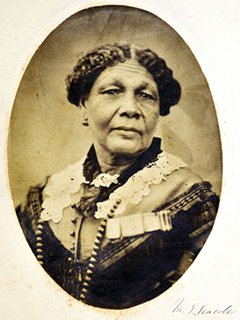In her 1857 autobiographical travel narrative, Wonderful Adventures of Mrs. Seacole in Many Lands, Jamaican-born medical healer Mary Seacole (1805-1881) recounted racism she experienced from Americans while traveling and working on the Isthmus of Panama. Seacole, also known as a “Crimean heroine” to her Victorian-era readers, documented her distaste for and encounters with Yankee bullying and aggression. Who was Mary Seacole, and what might it mean for audiences in the US to encounter her work today?
Seacole was, above all, an independent woman who was proud of her medical expertise. Before her journey to Panama, Seacole was born Mary Grant in Kingston, Jamaica. She was the child of a Scottish soldier and Creole woman. Seacole followed in the footsteps of her mother, who owned a boarding house and was a respected healer in Kingston. Widowed at thirty-nine, Seacole left Jamaica, joined her brother in Panama, and opened a hotel. Seacole’s travels between the Caribbean and Central America became experiences through which she honed her skills as a medical practitioner. Seacole traveled to England with hopes of joining Florence Nightingale and her assistants in caring for injured British soldiers fighting in the Crimean War (1853-1856). Her applications were rejected. Seacole’s autobiography recalls this rejection and asks: “Was it possible that American prejudices against colour had some root here? Did these ladies shrink from accepting my aid because my blood flowed beneath a somewhat duskier skin than theirs?”
Persistent in her efforts to aid and care for the army, Seacole and a distant relative funded her journey to the Crimea. She opened the British Hotel a couple of miles away from Balaclava and sold provisions to British soldiers. Seacole’s work was promulgated by a war correspondent who admired her skilled care and witnessed her “go down under fire with her little store of creature comforts for our wounded men.” Depicted in travelogues, illustrations, and newspaper accounts, Seacole rose to fame in Victorian England.
Although she was voted “Greatest Black Briton” in a 2004 poll, and although there have been recent efforts to feature her on British currency, Seacole and her book remain relatively obscure to audiences in the US. Not for long, I suspect. Alongside the contradictions that lie between her sensitivity to human vulnerability and her entrepreneurial spirit, between her identifications with empire and racial discrimination, Seacole’s unique experiences throw light on the possibilities and challenges to how we might care for each other today.
Dr. Kristina Huang is Assistant Professor of English at the University of Wisconsin-Madison. She’s currently working on a book that focuses on the reception and afterlives of Black Anglophone writings produced during the long eighteenth century.
